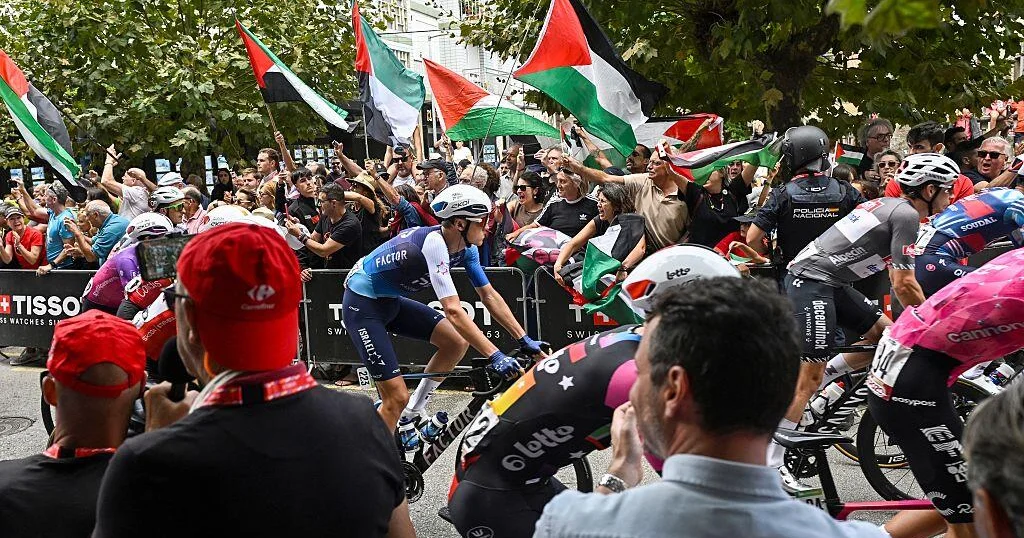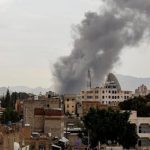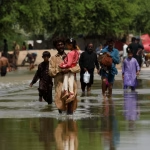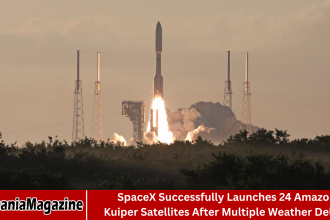Spain’s world-renowned cycling competition, La Vuelta a España, was not just a sporting event this year—it became the center of intense political expression and global controversy. As riders from across the world sped through the country’s roads, tens of thousands of demonstrators gathered in major Spanish cities, waving Palestinian flags, chanting slogans, and demanding international action against Israel’s military operations in Gaza.
- Why Spain Became a Center for Pro-Palestine Demonstrations
- The Scale of the Protests Around the Vuelta
- Spain’s Security Response to the Demonstrations
- The Symbolism of Sports and Politics Colliding
- Voices from the Protests
- International Reactions to the Protests
- The Role of Social Media in Amplifying the Protests
- The Historical Context of Spanish Solidarity Movements
- The Economic and Tourism Angle
- What Comes Next for Spain and the Pro-Palestine Movement
- FAQs
- Why did pro-Palestine protests target the Vuelta cycling race in Spain?
- Were the protests violent during the Vuelta in Spain?
- How did Spanish authorities respond to the protests?
- What impact did the protests have on the race itself?
- How do these protests fit into Spain’s broader political culture?
- Conclusion
The protests, which were some of the largest pro-Palestine demonstrations in Spain’s recent history, triggered a sweeping security response. Police forces were deployed in record numbers, checkpoints were erected near race routes, and aerial surveillance hovered above.
The clash between sport and politics at the Vuelta highlights how international events can become powerful platforms for activism. The race, traditionally a celebration of endurance and athleticism, suddenly transformed into a stage for one of the most polarizing issues in global geopolitics. For many Spaniards, the protests were not just about Palestine—they were about Spain’s own identity, its colonial history, its solidarity with oppressed peoples, and the role of public demonstrations in shaping foreign policy.
Why Spain Became a Center for Pro-Palestine Demonstrations
Spain has long been a hotbed for activism related to global justice movements. The country’s history of political resistance, from anti-fascist struggles to post-Franco democratic reforms, cultivated a culture where protests are seen as both legitimate and necessary. In the context of Palestine, Spanish cities have consistently hosted some of Europe’s largest solidarity marches, often organized by grassroots coalitions, unions, and student organizations.
A recent poll revealed that nearly 70% of Spaniards support the recognition of Palestine as a sovereign state. Spain’s left-wing political factions, including Podemos and several regional parties, have been vocal in criticizing Israel’s military actions. Against this backdrop, La Vuelta offered activists a unique opportunity: an international sporting spectacle watched by millions globally, with live coverage streaming across continents. By staging demonstrations during the race, protesters ensured their message reached audiences far beyond Spain’s borders.
The Scale of the Protests Around the Vuelta
The protests were massive and meticulously organized. In Barcelona, over 50,000 people lined the streets during one of the most high-profile stages of the race. Similar turnouts were recorded in Madrid, Valencia, and Bilbao. Demonstrators carried placards with messages such as “Stop the Occupation,” “Boycott Apartheid,” and “Freedom for Palestine.”
Many of the protests were peaceful, featuring cultural performances, speeches by human rights advocates, and coordinated chants. However, the sheer size of the gatherings raised concerns about safety. Spanish police reported isolated clashes between small groups of protesters and officers, though these incidents were rare compared to the overwhelmingly nonviolent demonstrations.
The protesters’ visibility was undeniable. Cyclists, commentators, and international viewers witnessed the Palestinian flag dominating the streets. For many, it became impossible to separate the athletic competition from the powerful political symbolism surrounding it.
Spain’s Security Response to the Demonstrations
The Spanish government anticipated large-scale protests and prepared accordingly. Authorities deployed more than 10,000 police officers nationwide during the most sensitive stages of the race. Security forces included riot control units, counterterrorism squads, and mounted patrols. Helicopters hovered above urban centers, and drones monitored protest crowds.
Checkpoints were established at key entry points to race venues, and fans were subjected to bag checks and metal detectors. According to Interior Ministry officials, the measures were not meant to silence protesters but to guarantee the safety of athletes, spectators, and demonstrators alike.
The balance was delicate: ensuring security without appearing to stifle freedom of expression. While some rights groups criticized the heavy police presence as intimidating, others acknowledged that Spain had managed to avoid the kind of violent crackdowns seen in other countries when dealing with political protests.
The Symbolism of Sports and Politics Colliding
Sport has long been a battleground for political expression, from the Black Power salute at the 1968 Olympics to boycotts of apartheid-era South Africa. The Vuelta protests are the latest chapter in this tradition. For activists, bringing the Palestinian cause to La Vuelta underscored the idea that no global event is apolitical.
Cyclists themselves responded with mixed feelings. Some riders expressed solidarity with the demonstrators, while others urged that politics should be kept separate from sports. International media coverage amplified the debate, with some outlets praising Spain for allowing protests to take place, while others criticized the disruptions.
The symbolism was powerful: athletes pushing themselves to the limit on the road, while just meters away, crowds demanded justice for a people under siege. The juxtaposition highlighted the duality of human struggle—one physical and sporting, the other political and existential.
Voices from the Protests
Activists and ordinary citizens described their reasons for joining the demonstrations. “We cannot stand silent while children are being killed in Gaza,” said Maria Torres, a student from Madrid who joined a march along the race route. “If the world is watching Spain because of this race, then we must use that spotlight to speak out.”
Others framed the protests in terms of Spain’s responsibility as part of the international community. “The European Union talks about human rights, but its governments continue to arm Israel. We must demand change,” said Javier Muñoz, a union organizer in Barcelona.
For many participants, the protests were not only about Palestine but also about opposing what they saw as Western double standards. “When Ukraine is invaded, the world reacts with sanctions and outrage. But when Palestine suffers decades of occupation, the response is silence,” said one demonstrator in Bilbao.
International Reactions to the Protests
The global response to the Vuelta demonstrations was swift. Palestinian officials praised the protests as a sign of growing solidarity in Europe. Israel, however, condemned the events, calling them “misguided” and accusing activists of spreading “anti-Israel propaganda.”
Human rights organizations, including Amnesty International and Human Rights Watch, applauded Spain for allowing demonstrators to make their voices heard without excessive repression. Meanwhile, sports governing bodies remained cautious, wary of being drawn into geopolitical disputes.
The international cycling community expressed concern about safety but largely acknowledged the legitimacy of peaceful protest. “Cycling has always been about freedom of movement, resilience, and endurance. In a way, those values align with the calls for justice we saw on the streets,” said a former Vuelta champion in an interview.
The Role of Social Media in Amplifying the Protests
Social media platforms played a pivotal role in magnifying the impact of the demonstrations. Hashtags such as #VueltaPorPalestina and #SpainForGaza trended across Twitter and Instagram during the race. Videos of massive crowds waving Palestinian flags quickly went viral, gaining millions of views within hours.
Activists used live streams to broadcast speeches, chants, and performances directly from protest sites, bypassing traditional media filters. This digital amplification ensured that the message reached audiences in the Middle East, North America, and beyond, turning Spain’s cycling event into a global political conversation.
The Historical Context of Spanish Solidarity Movements
To understand the protests, it is essential to situate them within Spain’s broader tradition of international solidarity. During the 20th century, Spain was a hub for anti-apartheid activism, Latin American solidarity campaigns, and opposition to the Iraq War. The Palestinian cause has been particularly resonant, with Spanish cities frequently passing symbolic resolutions supporting Palestinian rights.
Spain’s own colonial past also influences its perspective. As a nation that once ruled territories across continents, Spain’s engagement with issues of occupation and self-determination carries historical weight. Many Spaniards see their activism as part of a moral duty to oppose modern forms of oppression.
The Economic and Tourism Angle
For Spain, the protests also raised concerns about tourism and the global image of the Vuelta. The race attracts hundreds of thousands of international visitors each year and generates millions in revenue for host cities. While protests did not disrupt the race itself, the heightened security measures created logistical challenges for organizers.
Local businesses expressed mixed feelings. Some worried that the demonstrations deterred tourists, while others believed the attention elevated Spain’s role as a country willing to host democratic expression. Analysts estimate that while there may have been short-term economic disruptions, the long-term impact on tourism will likely be minimal, as Spain remains one of the world’s top destinations.
What Comes Next for Spain and the Pro-Palestine Movement
The scale of the protests suggests that Palestine will remain a central issue in Spanish activism for the foreseeable future. Organizers have already announced plans for future marches, cultural events, and academic campaigns aimed at pressuring Spain’s government to adopt a stronger stance in favor of Palestinian rights.
Diplomatic consequences may also unfold. Spain could face pressure from European allies and Israel to limit such demonstrations, though the country’s government insists it will continue to uphold the right to protest. The Vuelta protests may also inspire similar demonstrations at other international sporting events across Europe.
FAQs
Why did pro-Palestine protests target the Vuelta cycling race in Spain?
Protesters saw La Vuelta as an opportunity to highlight the Palestinian cause on a global stage. The race attracts international media coverage, making it a strategic platform for activism.
Were the protests violent during the Vuelta in Spain?
The vast majority of protests were peaceful, featuring marches, chants, and performances. While isolated clashes occurred, they were minimal compared to the overall peaceful nature of the demonstrations.
How did Spanish authorities respond to the protests?
The Spanish government deployed over 10,000 police officers, set up checkpoints, and used aerial surveillance to ensure security. Officials stressed that their goal was to maintain safety without suppressing free expression.
What impact did the protests have on the race itself?
Despite the large demonstrations, the race continued without major disruption. However, the political backdrop became a central theme in media coverage, merging sports and activism in the public eye.
How do these protests fit into Spain’s broader political culture?
Spain has a long history of solidarity movements and activism. The pro-Palestine demonstrations reflect this tradition, as well as widespread public support for Palestinian statehood.
Conclusion
The pro-Palestine protests surrounding the Vuelta cycling race in Spain were more than just a political outcry—they were a powerful reminder of the intersection between global sports and international justice movements. With massive crowds, heightened security, and worldwide attention, Spain found itself at the center of a debate that extended far beyond cycling. The demonstrations showcased the power of public solidarity, the resilience of democratic expression, and the ways in which sport can amplify struggles for human rights.
As the cyclists crossed their finish lines, so too did Spain complete a symbolic stage in its history of political engagement. The Vuelta will be remembered not only for its athletic triumphs but also for the voices that rose alongside it, demanding freedom, dignity, and justice for Palestine.










